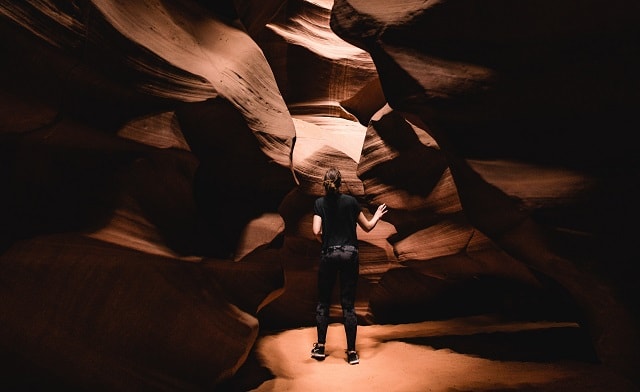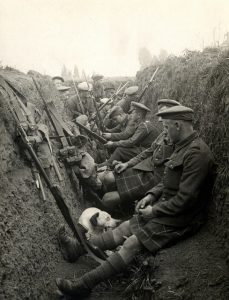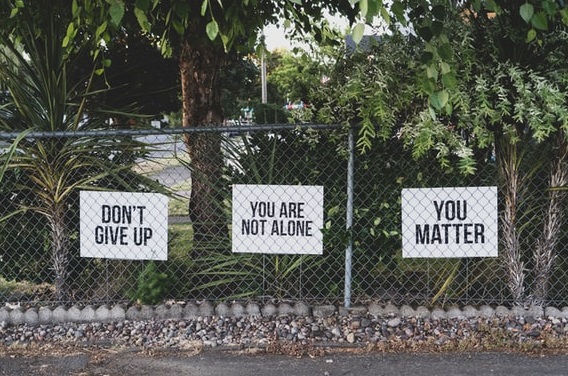
The adage says there are no atheists in foxholes. I don’t know about that, but I do know that when we are at the end of what we can do, that is when we seek something more.
According to history and archaeology, humans have sought favor from gods since long before monotheism came to be. In a time when life was truly on the edge, our ancestors sought every advantage they could to bring rain for their crops (but not too much), warm, dry air for the harvest, plentiful deer for meat, etc.
In recent centuries, we’ve become more adept at manipulating our environment to our desires, but Mother Nature still throws us curve balls like droughts, floods, wildfires, storms and pandemics.
Whether your foxhole is a burned-out home, a lost job, the loss of a loved one to illness, or any of the myriad trials humans face each day, almost all of us reach a point where we say, “I can’t deal with this anymore. Is there anyone or anything out there to help me?”
There was a time when churches, synagogues, mosques, temples, and other places of worship were the place to go for help. They were the centers of their communities. Everyone knew everyone and their needs and resources — or lack thereof. The community pitched in because they understood their connection, and that was what you did. Sometimes the activity was administered by the worship center, sometimes not.
But humanity has grown, moved around, and become unmoored from the old ways. We no longer know our neighbors, families are separated by hundreds and thousands of miles, and we are left adrift with our struggles and doubts. Worse, those who are supposed to be helpful and understanding have become judgmental and polarizing. Divisions exist among Christians, within Islam, and within many other faiths (let alone between those groups) that put dogma over theology, and politics over compassion.
I got caught in a power struggle within my home church some thirty years ago and was left hung out to dry by both sides (including the pastor who got me involved in the first place). Along with other events, that led to the darkest time in my life, where I was at the bottom of a foxhole with no way out. I had a hard decision to make.

I looked around and saw so many people who seemed to be miserable in their lives. They trudged along, complaining, and not really doing anything. “Living lives of quiet desperation.” Thoreau’s description was apt. I wanted to avoid that for myself at almost any cost.
One part of me was ready to give up. I made myself consider suicide and the ramifications. Nope, I couldn’t do that to my family. Plus, that seemed like thumbing my nose at God and the world in a throwaway fashion.
Finally, from the bottom of my foxhole that was more of a canyon, I said, “OK, God. I can’t do it by myself anymore. I need your help.”
Did everything suddenly get better? No. Did my attitude suddenly change? No. Did my understanding of God change? Yes, but slowly.
You see, despite all my training and study, some of the concept of God as a glorified Santa had crept into my personal theology. And when things didn’t go the way I thought they should, I was quick to cry, “Why me, God?”
For years I had blamed God for certain things that had happened in my life, but now I began to see them as the result of the actions of people. Frail, mistake-prone people just like (and including) me, with their own fears and doubts. And I saw God as someone who was neither clearing the way nor making my path harder, but who was walking beside me to pick me up when I stumbled.
There’s a tale that goes around in self-help circles about a man and his donkey. The man gets mad at his donkey and decides to get rid of him. He pushes him into a hole and starts shoveling dirt on top of him. The donkey shakes off the dirt and eventually walks out as the dirt raises the bottom of the hole.
I hate this story!
It illustrates the “pull yourself up by the bootstraps” mentality, ignoring the fact that so many of us don’t even have boots! When a person is facing mental illness, cancer, or the loss of everything they’ve known, a few shovels of dirt aren’t going to touch the Grand Canyon-sized chasm they find themselves in.
Instead of pulling me up from the bottom of the abyss with a winch, (my desire), I discovered God was the shepherd who walked through the Valley of Death with me until we came to a place that was climbable. And then God continued with me as I stumbled up the path, sometimes boosting from behind, sometimes pulling me over a tall rock, often reminding me to stop and rest, drink water, and enjoy the view.
And how did God do this? Through people!
When I decided not to give up, to get off the canyon floor in faith and start moving, I chose a multi-pronged approach. Doctors, counselors, and medication. As soon as I looked for help, people who had experienced similar challenges to mine reached out their hands. People who reminded me of God’s promises and were willing to embody those promises with hugs and listening ears. People who didn’t judge. People who understood Grace and were willing to share their journeys and understanding. Many — not all — were church goers. Sadly, few were from my home church.
It took me six years to climb up over the edge. Do I wish I hadn’t had to go through that? Of course. Do I regret that it happened? Not really. I grew in faith, understanding and wisdom during those six years more than I had the previous twenty-five. Sure, I had acquired a boatload of knowledge in High School and College. I had excellent teachers, many of whom tried to spare us certain difficult lessons. But some lessons must be learned the hard way.
I have learned that it’s not for me to tell God what to do or not do. Nor do I try to blame or credit God for things that happen in nature or because of human decision.
Does that mean I don’t pray? Of course not. Prayer helps me put things in perspective. When I pray for a new job, or healing, or blessings for someone, I’m letting God (and myself) know that I know God is at work in the world. It’s not my job to convince God to do or not do anything. When I pray “Your will be done,” I acknowledge that I can’t see the whole picture, but I have faith that the best outcome will happen, beyond my ability to see. And I’m grateful for good things that happen, whatever their source.
When something bad happens and someone says, “It was God’s will,” I cringe. I have no doubt that God wants the best for each one of us. But we humans make mistakes.
Last weekend a woman driving with three children crossed into oncoming traffic, killing the other driver and everyone in her vehicle. Was that God’s will? Not the God I know. We’ll never know if she was drunk, distracted or just tired. Or something entirely different. But saying it was God’s will for five people to die is putting God in a human-made box. By definition, God is greater than humanity, and I find that comforting, even if it is hard to comprehend.

So, even in the questions, I stick to Grace. “For it is by grace you have been saved, through faith — and this is not from yourselves, it is the gift of God — not by works, so that no one can boast.” Ephesians 2:8-9 (NIV)
Faith allows me to accept Grace in my life from God. Grace that walks me out of the valleys — out of the foxholes. Faith also allows me to share that same Grace with others, regardless of their beliefs. Because Grace is the manifestation of Love that we all need in our lives.
Whatever your foxhole might be, I wish you the gifts of Faith and Grace to see you through.
Hugs to you.